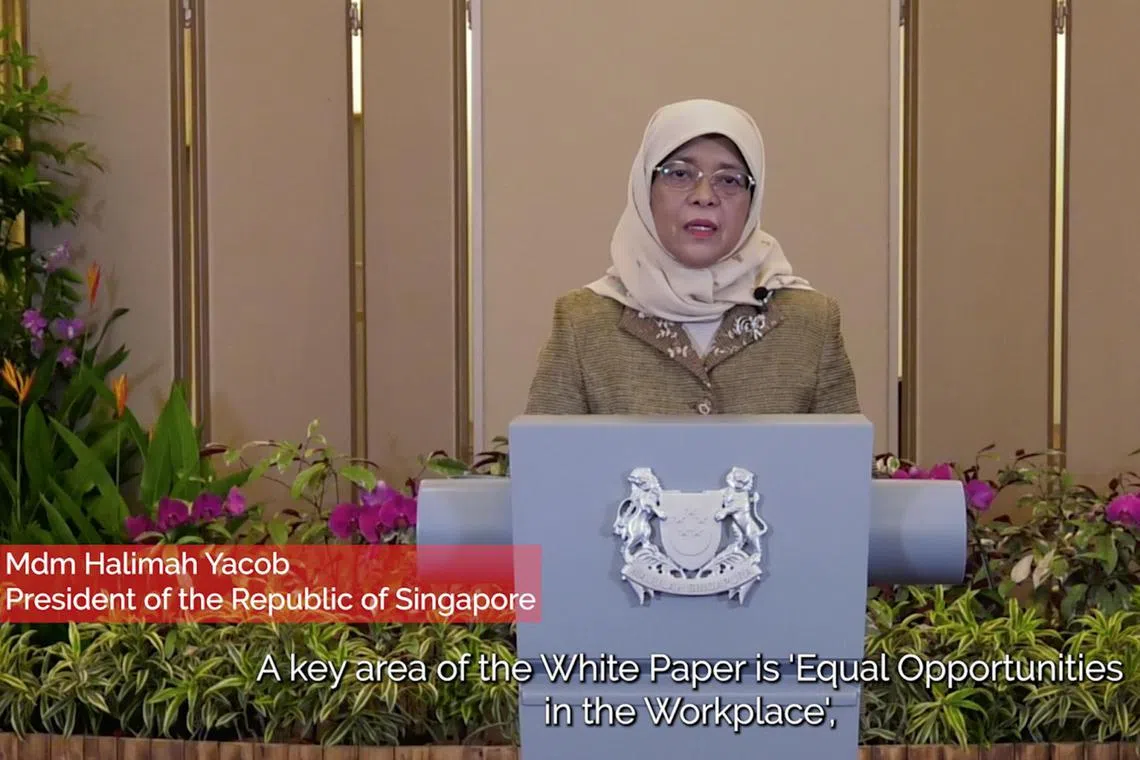World needs to address gender bias, and chart inclusive paths of growth post-pandemic: President Halimah
Sign up now: Get ST's newsletters delivered to your inbox

President Halimah Yacob said that women are indispensable partners in the sustainability space.
PHOTO: PRESIDENT'S OFFICE
Follow topic:
SINGAPORE - Women play an indispensable role in the sustainability space, but, beyond climate change, they continue to face gender bias in other areas that need to be addressed as the world recovers from Covid-19.
Delivering the keynote speech at the 17th Women’s Forum Global Meeting on Thursday, President Halimah Yacob noted that the pandemic has disproportionately affected women around the world.
“As we embark on global recovery efforts, we should seize the opportunities the pandemic has brought about, and chart new paths of growth and development that are more sustainable and inclusive,” said Madam Halimah, who delivered her speech virtually.
The event in Paris saw participants, including top female leaders from various sectors, discuss issues such as the climate crisis and the rise of global conflicts.
Madam Halimah said that women are indispensable partners in the sustainability space.
She cited a report by the Organisation for Economic Cooperation and Development, which showed that women are more likely to recycle, minimise wastage and practise sustainable consumption habits.
But there remain barriers for women such as a lack of equal opportunities in the workplace, unconscious gender bias perpetuating traditional notions
She said the Republic in 1961 passed the Women’s Charter, which institutionalised the equal standing of men and women in marriage here, improved healthcare services for women, and ensured equal access to education for boys and girls.
As a result, literacy rates of women aged 15 and above in Singapore have doubled from about 42 per cent to more than 96 per cent. Women today make up almost 30 per cent of Parliament as well.
Singapore wants to go further, Madam Halimah said.
For example, the White Paper on Singapore Women’s Development, 25 action plans
Madam Halimah noted that the pandemic has shown it is possible for workers to work from home.
Entrenching flexible work arrangements will help women to participate more fully in the workplace and allow both men and women to balance their responsibilities within and outside work, she added.
“Properly organised and implemented with a clear evaluation mechanism in place, hybrid work can open up more opportunities for women to enter the job market or remain working without compromising productivity,” she said, adding that hybrid work provides many women with the option to remain economically active and financially independent.
She called on employers to look at the best way to recruit and retain talent, and said that women form an important component of the talent pool. But beyond legislation and policies, a whole-of-society partnership is needed to engender broader mindset shifts, said Madam Halimah.
These include breaking gender biases and traditional expectations of roles that men and women play.
She urged men to play a greater role in caregiving, and employers to foster a more supportive and family-friendly workplace culture.
The President also said that parents and teachers can encourage both boys and girls, starting from a young age, not to be limited by gender stereotypes.
“Through this whole-of-society partnership approach, I look forward to a more equitable and inclusive future, where every man and woman is valued, and every woman has an equal opportunity to achieve her aspirations.”
Madam Halimah also spoke at the forum in 2020 and 2021, as well as when Singapore hosted the Women’s Forum Singapore in 2018 and the Women’s Forum Asia in 2019.
Other speakers at the 17th Women’s Forum Global Meeting included Spanish Deputy Prime Minister and Minister for Economy and Digitalisation Nadia Calvino, Unesco assistant director-general for the social and human sciences Gabriela Ramos and Singapore Management University president Lily Kong.


